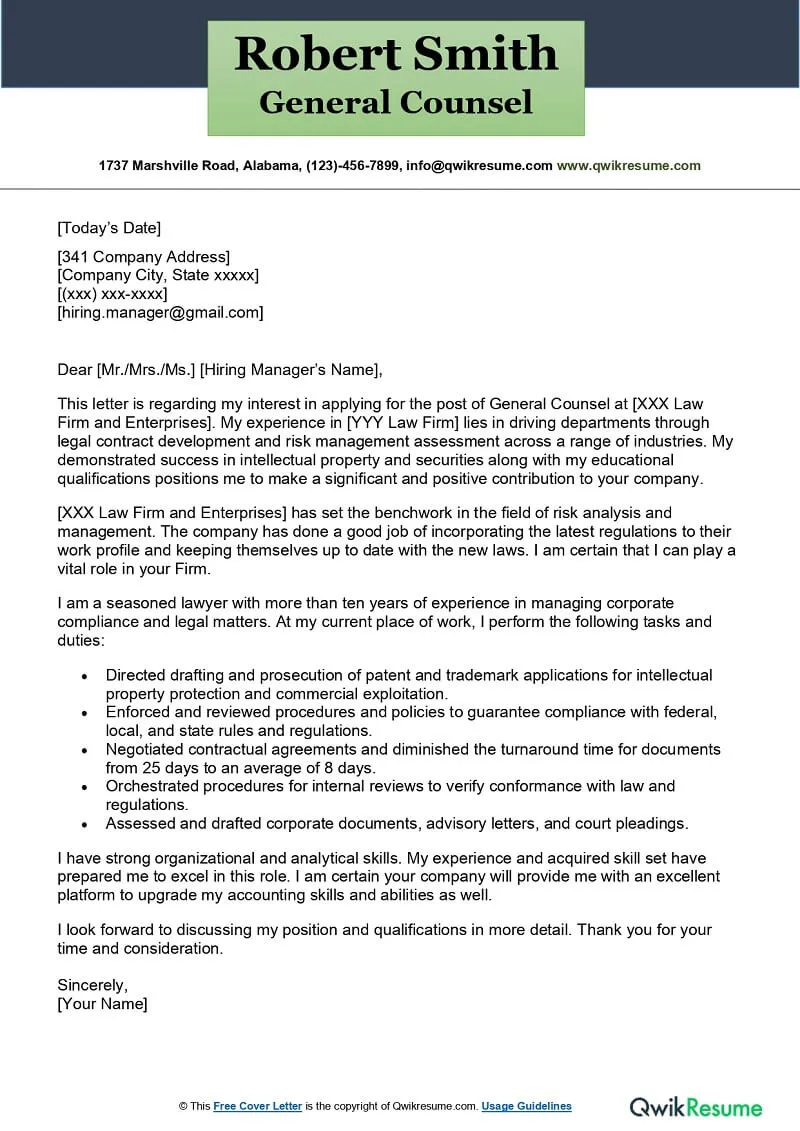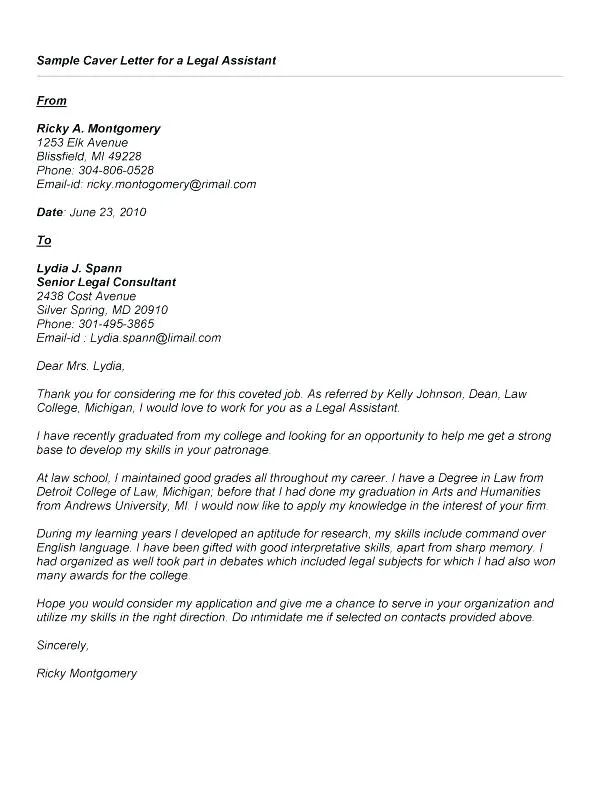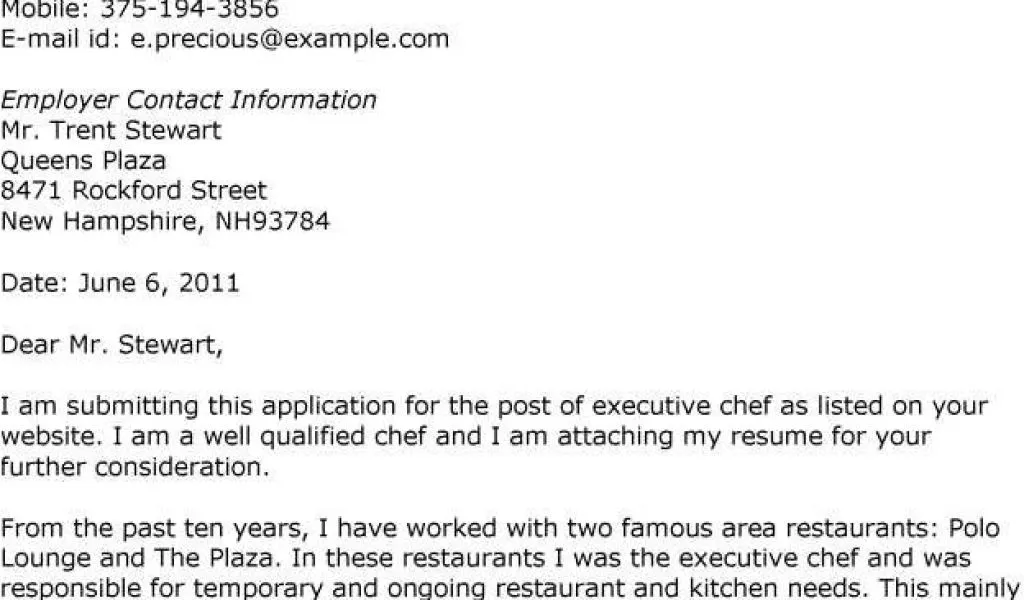Crafting a Cover Letter for In-House Counsel
A compelling cover letter is your introduction to a potential employer, offering a glimpse into your qualifications and suitability for the role. It allows you to showcase your unique story, explaining why you are the ideal candidate and how your skills align with the company’s specific needs. The cover letter should be professional and enthusiastic, demonstrating a genuine interest in the position. The main focus should be on what you can bring to the table, emphasizing your ability to provide practical legal solutions and protect the company’s interests. Crafting a well-written cover letter is an important tool in presenting yourself to the employer.
Highlighting Relevant Experience
When crafting your cover letter for in-house counsel, emphasizing relevant experience is critical. This includes any experience that demonstrates your ability to handle the legal needs of a company. Mention any experience in corporate law, contract drafting and negotiation, litigation management, regulatory compliance, and risk management. Instead of just stating that you have experience in contract law, describe a specific instance where you drafted, reviewed, or negotiated a significant contract, mentioning the value or impact of the contract. If you have industry experience, mention it, as this demonstrates your understanding of the industry’s unique legal challenges. Tailor your experience to align with the job description. This is what the employer is looking for in the candidate, so it’s important to include it. The more detailed you are, the more likely you are to capture the attention of the hiring manager.
Detailing Legal Expertise

Detail your legal expertise to show your capabilities. Mention specific areas of law in which you have significant experience, such as intellectual property, employment law, or environmental regulations, depending on the role. Provide examples of how you’ve applied this knowledge to solve legal issues or advise clients. If the role requires experience in intellectual property, describe your experience in prosecuting patents, managing trademarks, or handling copyright disputes. If the position involves employment law, highlight your experience in drafting employment agreements, handling employee disputes, or ensuring compliance with labor laws. Quantify your accomplishments whenever possible, such as the number of contracts reviewed, cases successfully defended, or policies implemented. This adds credibility and helps the hiring manager understand your value. Being specific will help you stand out, providing the reader with a quick grasp of your skills.
Emphasizing Company Understanding
Show your understanding of the company, its industry, and its legal challenges. Research the company thoroughly, including its mission, values, products or services, and current legal issues. Refer to specific aspects of the company’s business or recent developments in your cover letter to show you’ve taken the time to understand its operations. Explain how your skills align with the company’s needs. If you are applying to a technology company, for example, mention your familiarity with intellectual property law, data privacy, or software licensing. Address any specific legal challenges the company is facing or may face in the future. This shows that you have a proactive mindset and can anticipate potential problems. By addressing these specific issues, you highlight your ability to provide solutions and protect the company’s interests. This shows that you understand their business.
Showcasing Achievements and Results
Use your cover letter to showcase your achievements and the results you have delivered in previous roles. Focus on outcomes. Quantify your accomplishments whenever possible. For example, state how you reduced legal costs by a certain percentage, improved contract negotiation efficiency, or successfully defended a case that saved the company a significant amount of money. Use action verbs to describe your accomplishments and the results you achieved. Examples include negotiated, drafted, managed, resolved, implemented, and reduced. When describing a project, highlight your role, the actions you took, and the positive outcomes. Provide context by mentioning the challenges you faced and how you overcame them. Highlighting your achievements is a great way to show your potential employer your strengths.
Demonstrating Strong Communication Skills

In-house counsel roles require exceptional communication skills. Your cover letter is an opportunity to demonstrate your ability to communicate clearly, concisely, and persuasively. Write in a professional tone, using proper grammar and punctuation. Avoid jargon or overly complex language. Use clear and straightforward language that is easy to understand. Tailor your communication style to the company culture. If the company is known for its formal style, your cover letter should reflect that. If the company has a more relaxed culture, you can adjust your tone accordingly. Highlight your ability to communicate complex legal concepts to non-legal professionals. Show how you have explained legal issues to business executives, providing clear and concise recommendations. The cover letter is critical to show your ability to communicate. This could give you an edge over your competition.
Proofreading and Formatting the Cover Letter
Make sure your cover letter is free of errors. Proofread it for typos, grammatical errors, and formatting issues. Have a colleague review it as well. Use a clean and professional format. Choose a standard font, such as Times New Roman or Arial, and use a consistent font size. Make sure your cover letter is easy to read. Ensure the layout is well-organized, with adequate white space. Include your contact information, including your name, address, phone number, and email address, at the top of the letter. Addressing the cover letter to a specific person, such as the hiring manager, will show that you pay attention to detail and show that you have done your research.
